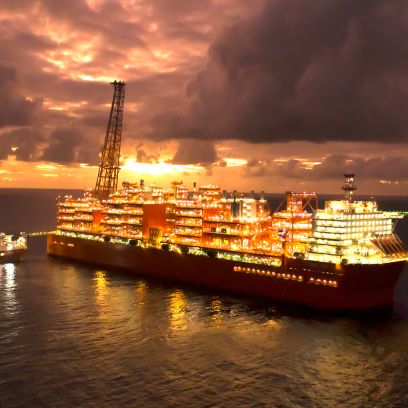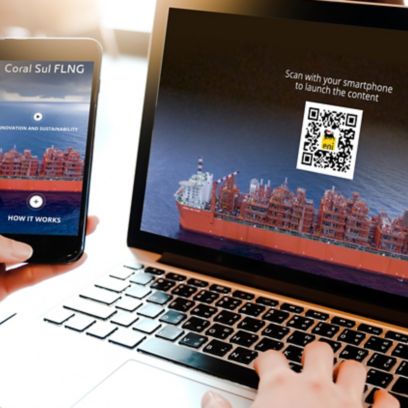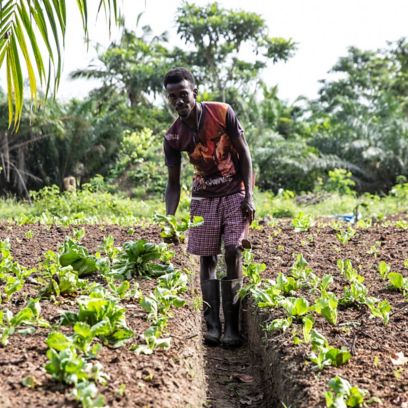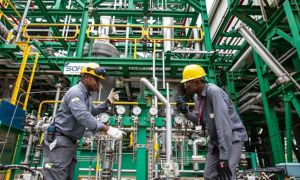Type of activity
Liquid natural gas (LNG)
Oil & Gas
Access to water and sanitation
Community health
Education
Environmental protection

Or , our new artificial intelligence tool.

Coral South develops the gas from Mozambique's huge offshore fields by transforming it into liquefied natural gas (LNG) that can be transported by ship and distributed globally. At the heart of the project is the floating liquefaction unit Coral Sul FLNG, a mix of technology and sustainability.
With the first LNG cargo leaving Coral Sul, Mozambique became an energy-producing country, acquiring the capacity to independently support its own development and contributing to security of supply. The result of a series of Eni exploration successes in an area that was considered a frontier, Coral South is proof of the great potential of liquefied natural gas.
Country: Mozambique
Activity start date: 2016 – present
Coral South is the first project approved by Area 4 partners in the Rovuma Basin for the development of natural gas resources discovered offshore Mozambique. It concerns in particular the southern part of the Coral field, with an estimated reserve of about 500 billion cubic metres. Its technological heart is the Coral Sul FLNG, a floating liquefaction plant that transforms gas into LNG, i.e. liquefied natural gas. When loaded onto special ships, the LNG can reach any market. This way, Mozambique contributes to ensuring global gas supplies.
The Coral Sul FLNG is the first floating natural gas liquefaction unit built for the African continent, the third of its kind in the world. The vessel is a model of energy efficiency as it was designed and built for energy optimisation and CO2 emission reduction thanks to a range of technologies:
With the Coral South Project, the future of energy sets sail.
10 October 2023
The Coral South project has adopted a Grievance Mechanism and specific Stakeholder Engagement Plan for the execution phase. The implemented Grievance Mechanism (GM) guarantees a proactive and structured approach enabling the project to receive, recognize, investigate, respond and resolve complaints and grievances from individuals/groups of individuals and organizations in a timely manner. A specific Stakeholder Engagement Plan (SEP) is in place to ensure that all interested and affected parties are proactively informed and engaged during the execution phase. The plan establishes regular ways of information disclosure on the project activities and their impacts. Grievances can be lodged through the project green line number 800840840 (only inside Mozambique country) or email address, that can also be used to request additional information on the GM and SEP.
The Coral South project includes a Sustainability Plan in which we are involved with a series of actions to provide access to water, health and education for local communities. Further initiatives we are carrying out concern environmental protection, in particular the restoration of mangroves, a key habitat for climate change mitigation. At the same time, we are supporting the country in its development by providing specialised training to more than 800 people in the area.
production net to Eni amounted (thousand barrels of oil equivalent per day)
connected to the FLNG production unit
estimated Gas In Place Coral field
capacity of the floating plant for liquefaction of natural gas
The first cargo of liquefied natural gas produced from the Coral South Field departed from the FLNG plant.
Gas was introduced into the plant and Coral Sul FLNG was getting ready to produce LNG.
The FLNG (Floating Liquefied Natural Gas) will be towed and anchored in the Rovuma Basin.
The start-up phase of Coral has been launched.
Find out more: https://bit.ly/3MSghCr
___
Facebook: https://www.facebook.com/EniItalia
Twitter: https://twitter.com/eni
Instagram: https://www.instagram.com/eni/
Linkedin: https://it.linkedin.com/company/eni
25 November 2022

If you want to change topic, clear the chat and make a new query to receive more relevant results.
This will delete the question history.
If you want to change topic, clear the chat and make a new query to receive more relevant results. This will delete the question history.
Here you can find the full list of your queries.
The answers are generated by artificial intelligence, therefore they may contain inaccuracies. Please read the terms and conditions of use.

EnergIA is an innovative tool based on artificial intelligence capabilities, which can help you navigate the contents of eni.com, quickly finding answers to your questions. EnergIA can also perform a search on a specific topic, providing the most up-to-date data available, or it can invite you to delve deeper into a topic of your interest by suggesting links and specific readings. Start now!
EnergIA is an innovative tool based on artificial intelligence capabilities, which can help you navigate the contents of eni.com, quickly finding answers to your questions. Start now!
EnergIA (ener'dʒia) is a system based on Generative Artificial Intelligence.
Thanks to this technology, we can respond to your requests by querying the most relevant content and documents available on eni.com. (Note: financial documents from the last 12 months and press releases from the last 2 years are considered.)
Through EnergIA, you can delve into topics of interest and have a real-time window into the world of Eni.
If you wish to search for a specific document, press release or news, use the traditional search engine via the magnifying glass icon.
Like all systems that leverage Generative Artificial Intelligence, EnergIA may generate inaccurate or outdated responses. Always consult the sources that EnergIA proposes as the origin of the generated information.
If the system fails to find an exact match for the requested content, it still tends to provide a response.
If you find any inaccuracies in the provided response, please send us your feedback at the bottom of the page: it will be very helpful for us to improve.
Remember that the content generated by the system does not represent Eni’s official position. We therefore invite stakeholders to refer to their designated contacts for official statements: Press Office for journalists, Investor Relations for analysts and investors, Company Secretariat for shareholders etc..
EnergIA can understand questions posed in almost all languages, but we prefer to provide you with a response in English or Italian, the two languages available on eni.com. If you ask a question in Italian, the content on the site in Italian will be consulted. If you ask it in English or any other language, the content in English will be consulted. (Note: the language Eni uses for financial documents/content is predominantly English.)
If questions are formulated that violate the set security criteria, the system will not proceed with processing the response. Please remember not to send personal data.
By using this service, the users acknowledge that they have read and accepted the terms and conditions of use.
Search
EnergIA (ener'dʒia) is a system based on Generative Artificial Intelligence.
Thanks to this technology, we can respond to your requests by querying the most relevant content and documents available on eni.com. (Note: financial documents from the last 12 months and press releases from the last 2 years are considered.)
Through EnergIA, you can delve into topics of interest and have a real-time window into the world of Eni.
If you wish to search for a specific document, press release or news, use the traditional search engine via the magnifying glass icon.
Like all systems that leverage Generative Artificial Intelligence, EnergIA may generate inaccurate or outdated responses. Always consult the sources that EnergIA proposes as the origin of the generated information.
If the system fails to find an exact match for the requested content, it still tends to provide a response.
If you find any inaccuracies in the provided response, please send us your feedback at the bottom of the page: it will be very helpful for us to improve.
Remember that the content generated by the system does not represent Eni’s official position. We therefore invite stakeholders to refer to their designated contacts for official statements: Press Office for journalists, Investor Relations for analysts and investors, Company Secretariat for shareholders etc..
EnergIA can understand questions posed in almost all languages, but we prefer to provide you with a response in English or Italian, the two languages available on eni.com. If you ask a question in Italian, the content on the site in Italian will be consulted. If you ask it in English or any other language, the content in English will be consulted. (Note: the language Eni uses for financial documents/content is predominantly English.)
If questions are formulated that violate the set security criteria, the system will not proceed with processing the response. Please remember not to send personal data.
By using this service, the users acknowledge that they have read and accepted the terms and conditions of use.
A new window into Eni’s world, at your disposal. EnergIA is an innovative tool based on artificial intelligence capabilities, which can help you navigate the contents of eni.com, quickly finding answers to your questions.





